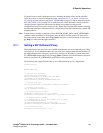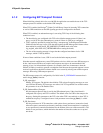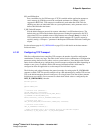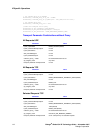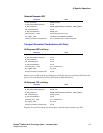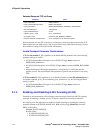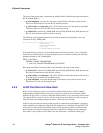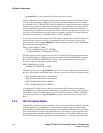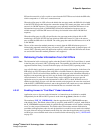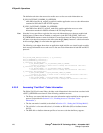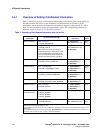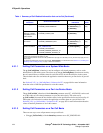Dialogic
®
Global Call IP Technology Guide — November 2007 117
Dialogic Corporation
IP-Specific Operations
Fast start connection, on the other hand, reduces the time required to set up a call to one round-trip
of delay after the H.225 TCP connection is established by “piggy-backing” the local endpoint’s
media capabilities and RTP port in the Q.931 Setup message in a “fastStart element”. If the remote
side supports fast start connection, it returns the capability parameters in the Alerting, Proceeding,
or Connect messages.
Note: In an H.323 fast start call, the fast start element is included in the H.225 Proceeding or Alerting
from the remote side only when the application explicitly specifies the coders. If no coder is
specified (either a preferred coder or “don't care”) before gc_CallAck( ) and gc_AcceptCall( ) the
fastStart element is not sent out until the Connect (that is, after gc_AnswerCall( )).
4.2.3 H.323 Fast Start with Optional H.245 Channel
Because the H.323 fast start mode uses fastStart elements that are embedded in H.225/ Q.931 call
setup messages rather than explicit messages on the H.245 channel, the establishment of the H.245
channel becomes optional unless that channel will be needed for other purposes, such as
transmission of UII Alphanumeric digits or T.38 fax mode.
When a Global Call application is using the fast start connection mode, it can indicate that the
H.245 channel is indeed optional, which allows the call to be considered established earlier. In a
normal fast start connection, the Dialogic
®
Global Call API library does not generate a
GCEV_CONNECTED or GCEV_ANSWERED event (to indicate to the application that call
establishment is complete) until after the H.245 channel establishment (Phase B) is complete.
When the application at the calling party specifies that the H.245 channel is optional, the library
generates a GCEV_CONNECTED event as soon as the H.225 call setup (Phase A) is complete
unless the remote endpoint has forced the call to fall back to slow start mode. When the application
at the called party specifies that the H.245 channel is optional, the library generates a
GCEV_ANSWERED event as soon as the H.225 call setup is complete.
The default Global Call behavior is to treat H.245 channel establishment as mandatory (non-
optional), so that GCEV_CONNECTED/GCEV_ANSWERED is only generated after the H.245
channel has been established. The application can specify whether the H.245 channel is optional in
fast start mode by including the following parameter element in a GC_PARM_BLK block:
IPSET_CALLINFO
IPPARM_FASTSTART_MANDATORY_H245CH
with one of the following enumerated values:
• IP_FASTSTART_MANDATORY_H245CH_ON – H.245 channel establishment is
mandatory in fast start connections (default mode)
• IP_FASTSTART_MANDATORY_H245CH_OFF – H.245 channel establishment is
optional in fast start connections
Note: This parameter is ignored for calls that use slow start call setup.
An application can set the H.245 channel establishment mode on a system-wide, per line device, or
call-by-call basis, depending on what Global Call function is called to set the parameter:
• gc_SetConfigData( ) sets the specified H.245 mode for the entire system (all line devices on
all board devices).
• gc_SetUserInfo( ) with duration = GC_ALLCALLS sets the specified H.245 mode for a
given line device.



